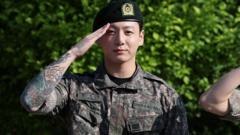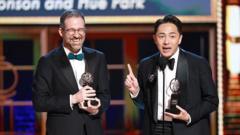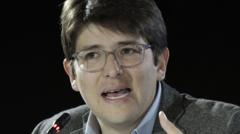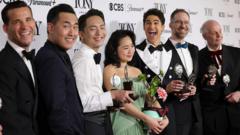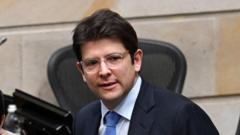**In a challenging context marked by political strife and a deeply divided populace, Lee faces the dual tasks of unifying the country and tackling urgent international trade relations.**
**One Door Closes, Another Opens: Lee Jae-myung's Election as South Korea's President Marks a New Era**

**One Door Closes, Another Opens: Lee Jae-myung's Election as South Korea's President Marks a New Era**
**Following months of turmoil, South Korean voters choose Lee Jae-myung as their new president, signalling a pivotal shift in the nation's political landscape.**
After significant political chaos that culminated in the ousting of former president Yoon Suk Yeol, South Korea has elected opposition candidate Lee Jae-myung as its new president. Lee's victory represents a rejection of the ruling People Power Party (PPP), which has been stained by the controversial martial law attempt spearheaded by Yoon. During this turbulent period, public outrage grew and massive protests erupted, ultimately leading to Yoon's impeachment.
As victorious news reached the nation, Lee refrained from immediate celebration, indicating that restoring democracy is his preliminary focus. This election marks a remarkable comeback journey for the 61-year-old, who narrowly lost to Yoon three years ago. Despite being embroiled in various controversies, he has succeeded in garnering significant public support amidst a backdrop of discontent.
Analysts interpret the election results as an expression of voters' collective disapproval of the PPP rather than an endorsement of Lee's specific political agenda. "The election became a vehicle for expressing outrage against the breakdown of democracy," stated Park Sung-min, a political analyst. The void left by Yoon's exit has deepened rifts within the PPP, resulting in a disorganized party struggling to recalibrate.
As Lee takes office, he must also contend with legal challenges. A Supreme Court trial related to allegations of election law violations was postponed until after the election, as a guilty verdict could inhibit his governance. However, the law protects sitting presidents from prosecution in most cases, posing yet another layer of complexity to an already thick political fog.
Lee’s presidency could necessitate collaboration across party lines with the PPP, a party he frequently confronted during Yoon's administration. This need for bipartisanship underscores the dichotomy of healing a polarized landscape while pursuing accountability for Yoon’s controversial rule. Public sentiment remains starkly divided, with many of Yoon's staunch supporters still echoing pro-right narratives, ensuring ongoing tensions.
Meanwhile, as national unity remains a distant goal, Lee is acutely aware of the challenge posed by an ever-changing international landscape, notably in negotiations with the incoming Trump administration regarding trade. "The intertwining of South Korea's domestic issues with global dynamics is more pronounced than ever," remarks Park, emphasizing the implications for South Korea's economy and security.
With a promising voter turnout of 79.4 percent, marking the highest since 1997, citizens' engagement in the electoral process greatly reflects their determination for change. Lee pledged to honor the expectations placed upon him, setting a challenging path ahead in unison with both domestic stability and international cooperation. The journey for South Korea begins anew, with hopes pinned on Lee Jae-myung to guide the nation toward a more unified and stable future.



